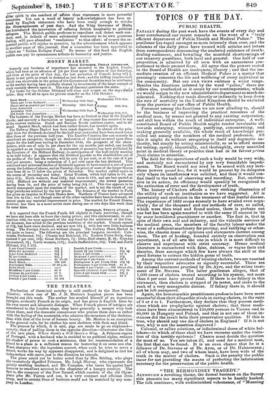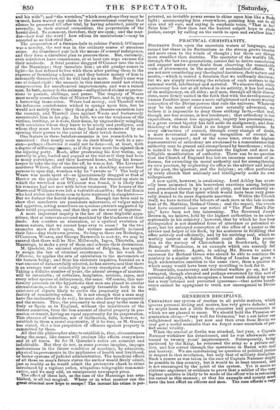"THE BERMONDSEY TRAGEDY."
ALTHOUGH a revolting theme, the dismal business on the Surrey side presents too many significant aspects to be hastily hushed. The talk continues, with undiminished vehemence, of "Manning and his wife"; and "the wretches," which sans phrase they may be termed, have waived any claim to the conventional courtesy that silence be preserved till after trial, by having admitted, jointly or severally, in their mutual accusations, the perpetration of the horrid deed. To comment, therefore, they are open; and the mur- der—how foul the word! how odious its associations 1—may be accepted as an historical fact.
The preparation of a furnace-hole to calcine Patrick O'Connor was a novelty, the rest was in the ordinary course of atrocious crime. An abandoned pair lack the means of sensual indulgence, and they form a diabolical plan to procure them. But, curiously, even murderers have consciences, or at least can urge excuses for their misdeeds. A fatal passion dragged O'Connor into the toils of the Meanings; they immolate him ; an old grudge comes to light—he had refused to live with them after putting them to the expense of furnishing a house; and they borrow money of him to indemnify themselves, till he will lend no more. Rush's case was one of tenant-right : the assassin in this instance could not obtain compensation for unexhausted improvements, and was a ruined man. In both, money is the animus—unliquidated claims or preten- • aims to pounds, shillings, and pence. The tragedy of Weare most nearly resembles that of Minver Place, and it, in origin, was a borrowing transaction. Weare had money, and Thurtell with his infamous confederates wished to sponge upon him, but he would not satisfy them : they then plan a pleasure-excursion into the country, and Thurtell rises against Weare and barbarously assassinates him in his gig. In both, we see the weakness of the victims, inviting, as it were, their doom, by unguardedly mingling with associates whom they knew to be needy and profligate, and whom they must have known they had made enemies of by not opening their purses to the extent of their lavish desires. One feature in these butcher-assassins is too remarkable to be unnoticed : they mostly seem to do their bloody work in a pas- sion—perhaps otherwise it could not be done—or, at least, with a degree of self-comp'aisance, as if they were more the injured than the injuring party. Rush, after prostrating his first victim, ap- parently in glee, loaded and popped at the rest as if they had been so many partridges; and then hastened home, telling his house- keeper to take the top of the fire off, he was so hot. The Liverpool murderer Wilson, after tnassacreing in a shocking manner four persons in open day, wonders why he "sweats so "1 The body of • Weare was made sport of—as ignominiously dragged as that of Hector on the plains of Troy ; and from the trussed-up state in • which the wretched man O'Connor was found, it is likely that his remains had not met with better treatment. The houses of the Marrs and Williams were left a veritable shambles; the foul fiends who had stolen into them seem to have wantoned in slaughter— But we forbear the horrid description. Enough has been said to show that murderers are passionate miscreants, of vulgar minds and appetites, acting sometimes on specious pretexts suggested by their rabid propensities, and that they are the worst of ingrates. A more important inquiry is the law of these frightful appa- ritions, that at intervals astound mankind by the blackness of their deeds. Are murders an aberration, or a cyclical evolution of human nature, that we cannot hope ever to cease ? In the two examples most dwelt upon, the victims manifestly induced their fate—dug their own graves. So long as there are Roderigos, O'Connors, Weares, and George Barnwells in society, we may be • assured that there will be Mrs. Millwoods, Iagos, Thurtells, and Mannings, to make a prey of them and scheme their destruction.
M. Quetelet, the eminent statistician of Belgium, has sought to assign the law of criminal occurrences. In his work Sur 1 'Homme, he applies the arts of calculation to the movements of tht human being ; and from his elaborate inquiries, founded on a vast amount of data carefully selected, he has ascertained that there is an average rate of criminality in every description of offences. Taking a definite number of years, the annual average of murders will be invariable ; of robberies, burglaries, suicides, rapes, and every other species of delinquency, the same. Of course, this uni- formity proceeds on the hypothesis that men are placed in similar circumstances,—that is to say, equilly favoutable both in the existence of objects likely to excite the propensity and in the facility of committing crime. It is not enough that a man may have the inclination to do evil ; he must also have the opportunity and the means. Thus, the propensity to steal may be the same in Italy or Spain as in England, without the inhabitants of the
• former countries, from the less amount of chattel property in pos- session or transit, having an equal opportunity for its perpetration. This absence of seduction, not of inclination, fails, however, to establish in them a moral superiority, if it be true, as M. Guerry has stated, that a less proportion of offences against property is • coMmitted by them.
• All that the philosopher aims to establish is, that, circumstances being the same, like causes will produce like effects everywhere and at all times. So far M. Quetelet's ratios are constant and indubitable. But they do not, as some persons imagine, impugn meliorations in the future condition of mankind, by education, physical improvements in the appliances of health and livelihood, or better systems of judicial administration. The beneficial effects of all these on man's future status the author would freely admit, just as readily as he would admit the preventive check to crime introduced by a vigilant police, ubiquitous telegraphic communi- cation, and we may add, an omnipresent newspaper press. .The effect of these last, as the case of the Mannings has este- .1thshed, is all but magical. Where or in what manner can the great criminal now hope to escape? The instant his crime is per- petrated, an invisible power seems to shine upon him like a Bude light ; accompanying him everywhere, pointing him out to all eyes and all ears, and saying in emphatic voice, "That is he! Seize him !" How then can the hunted culprit hope to elude justice, except by calling on the earth to open and swallow hint



























 Previous page
Previous page